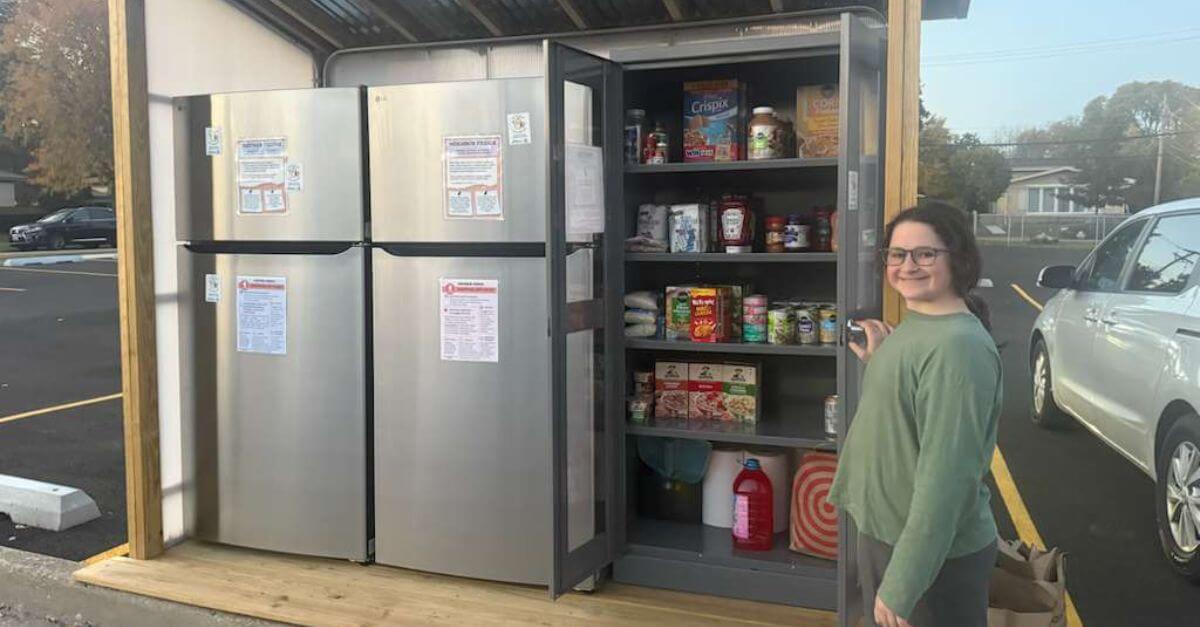For kosher families in need, a new community fridge offers food — and anonymity
‘Hersh’s Fridge’ stepped up to feed kosher households when SNAP benefits froze

Hersh’s Community Fridge in Skokie, Illinois. Courtesy of Solu
When SNAP payments froze during the government shutdown earlier this month, Rabbi Hody Nemes worried about a particularly vulnerable group: kosher families, who already pay 20-50% higher prices for groceries and have fewer food pantries available to them.
Across Chicago, “community fridges” have long offered a lifeline to food insecure families — outdoor refrigerators stocked by volunteers, where anyone can take what they need, no questions asked. But for kosher households, those fridges were effectively off-limits.
Solu, an Orthodox Jewish social services nonprofit, decided to fix that. Last month, it opened the area’s first kosher community fridge in a parking lot in Skokie, a Chicago suburb with a large Orthodox population. With the blessing of the Goldberg-Polin family, Solu named it “Hersh’s Community Fridge” — a tribute to Hersh Goldberg-Polin, the slain Gaza hostage whose parents once attended Ida Crown Jewish Academy in Skokie.
At Hersh’s Fridge, the food is divided into three sections: refrigerated groceries bearing a reliable hechsher, or kosher certification; food cooked in kosher homes; and a pantry with kosher-certified shelf-stable goods. Volunteers monitor the fridge for compliance with kosher food standards — not an uncomplicated task for a fridge where anyone can drop off food at any hour of the day. A club of around 100 students at Ida Crown in “Hersh’s Fridge Club” have pitched in, ensuring that each homemade item includes a label attesting, on the honors system, that it was prepared in accordance with Orthodox halacha.
“We have to set a standard so that people can feel confident taking food, and that they won’t open the fridge and discover, like, a box of bacon and Popeyes,” Nemes said.
Demand surpassed expectations, spiking significantly as soon as SNAP benefits paused, said Nemes. Volunteers struggled to keep the fridge stocked fast enough.
That revealed to organizers that there was more need in their community than initially thought.
“Even in our shul community at Skokie Valley, someone approached and said, ‘When is the fridge starting?’ And our assumption was they wanted to get involved. And they were like, ‘No, I need to know, because I need to be able to take,’” Nemes said.
Kosher food is available at pantries like The Ark in Northbrook, about a half-hour away, but the fridge provides two advantages traditional food banks don’t: 24/7 access and anonymity.
Judaism considers anonymous giving the highest form of charity, Nemes noted — a principle Hersh’s Fridge fulfills. Just as important, he added, is anonymous receiving, which allows people to maintain their dignity.
That anonymity matters, said Ilana Horwitz, an assistant professor of Jewish Studies and sociology at Tulane University who researches Jewish poverty. Shame and stigma, she said, are among the biggest barriers preventing financially vulnerable Jews from seeking help.
Her research uncovered many such cases, including a Modern Orthodox woman with an advanced degree who appeared financially secure but was quietly overwhelmed by medical bills. Rather than go to the local food bank — where the volunteers were often her fellow congregants — she drove 20 miles to one where she wouldn’t be recognized.
“There is a particular kind of stigma because of this narrative we have in the Jewish community of like, Oh, Jews have been very upwardly mobile. Jews are really successful,” Horwitz said. “Anybody who sort of falls outside of that scope feels like they did something wrong.”
Leah Rubin, a Solu board member, said she experienced her own wake-up call at her day job as a psychotherapist. She routinely offers snacks like chips or candy to the children who come into her office. But one day, a child spotted a can of tuna in her pantry and asked for that instead — explaining she hadn’t eaten all day.
Rubin later learned the family relied on a kosher food bank that offered pickup only a few times a month and felt uncomfortable asking for additional help.
“It became really clear that within the Jewish community in particular, there is a need for an anonymous, easy, grab-and-go” service that enabled people “to feed themselves and their families in a dignified way,” Rubin said.
Nemes emphasized that the fridge doesn’t just serve Jewish families. He said it’s been especially moving to see neighbors of different faiths take food from a fridge named for Hersh, who was involved in interfaith efforts, using soccer to connect Israeli and Palestinian children. Still, he cautioned, the community shouldn’t assume Jewish families don’t also need help.
“We live in a suburban community where a lot of people have said, ‘Is there really need here?’” Nemes said. “We’re seeing that it is needed, based on the response.”
Disclosure: Nemes contributed to the Forward from 2013 to 2015, as a staff reporter for some of that time.
















